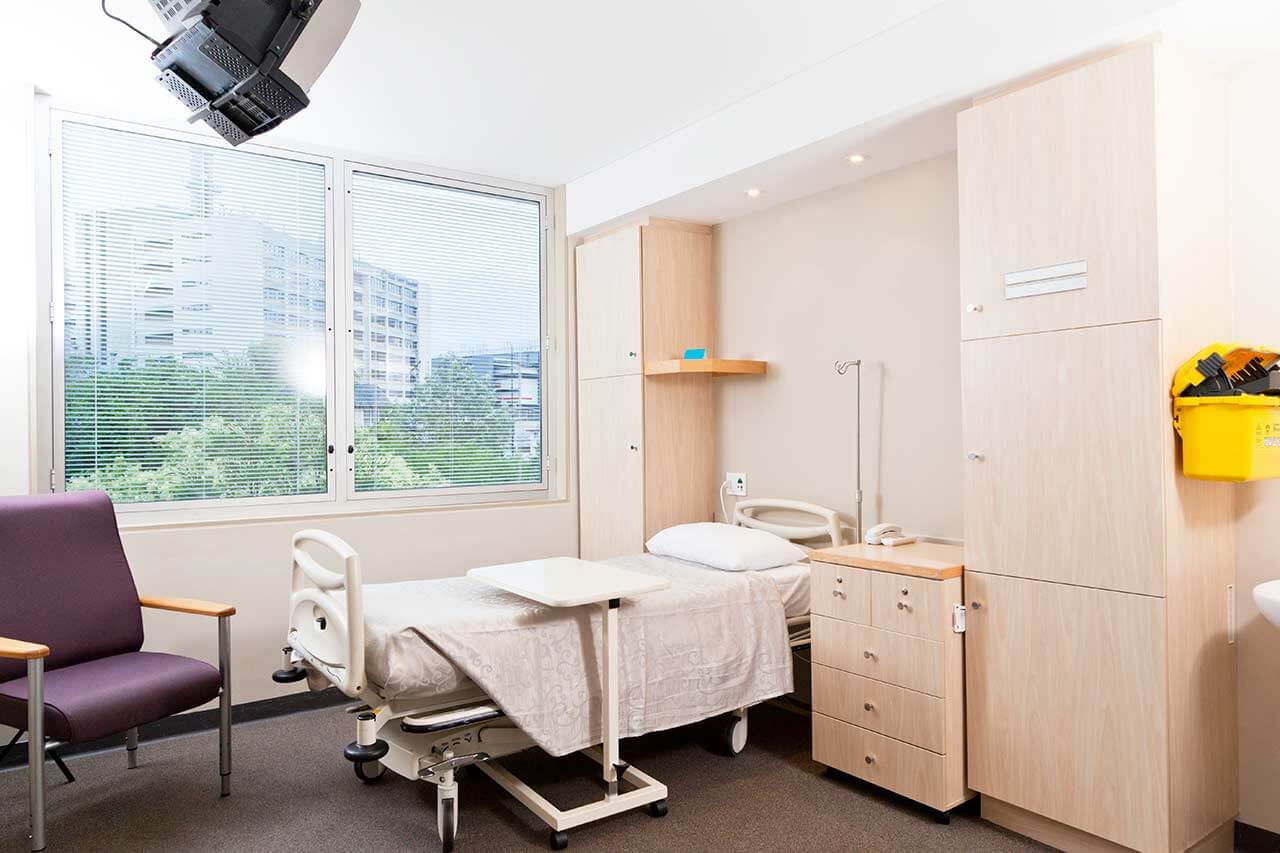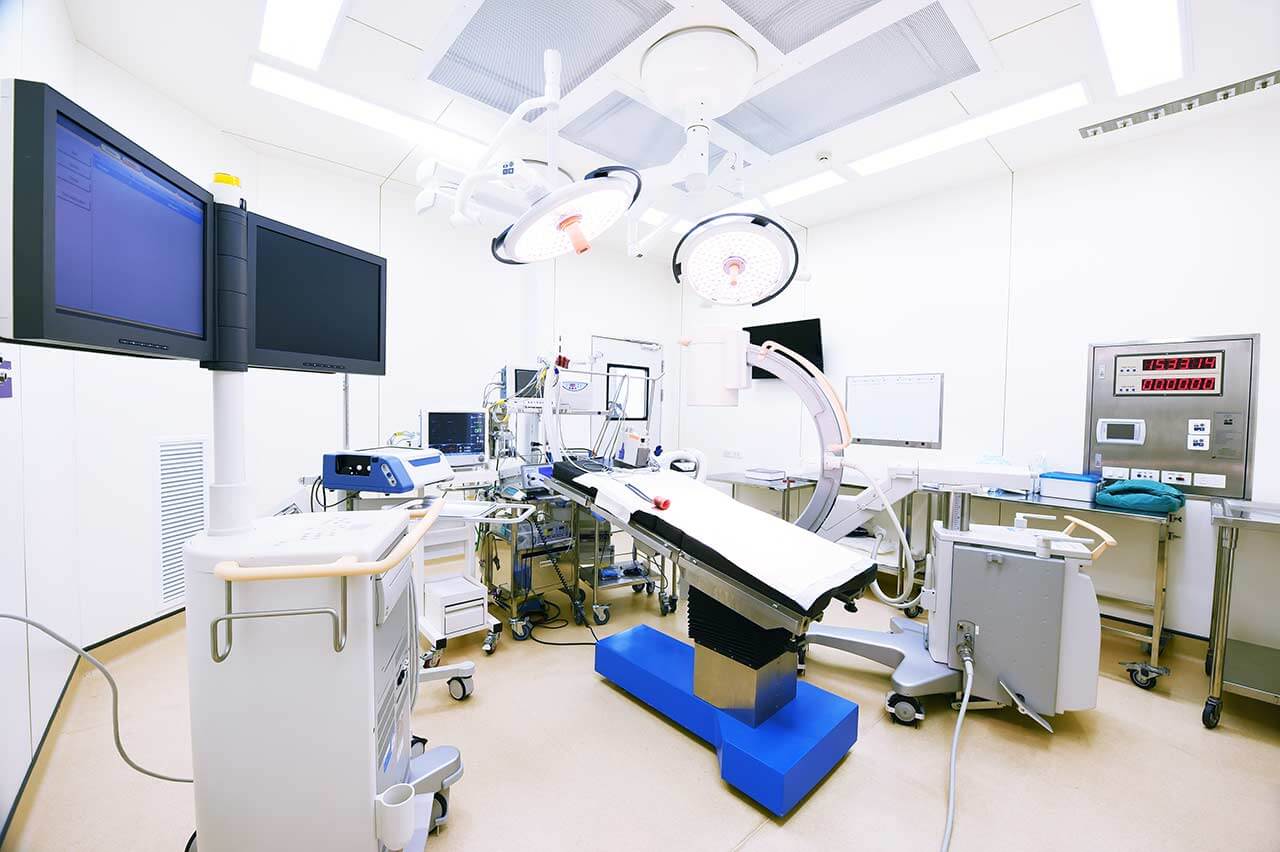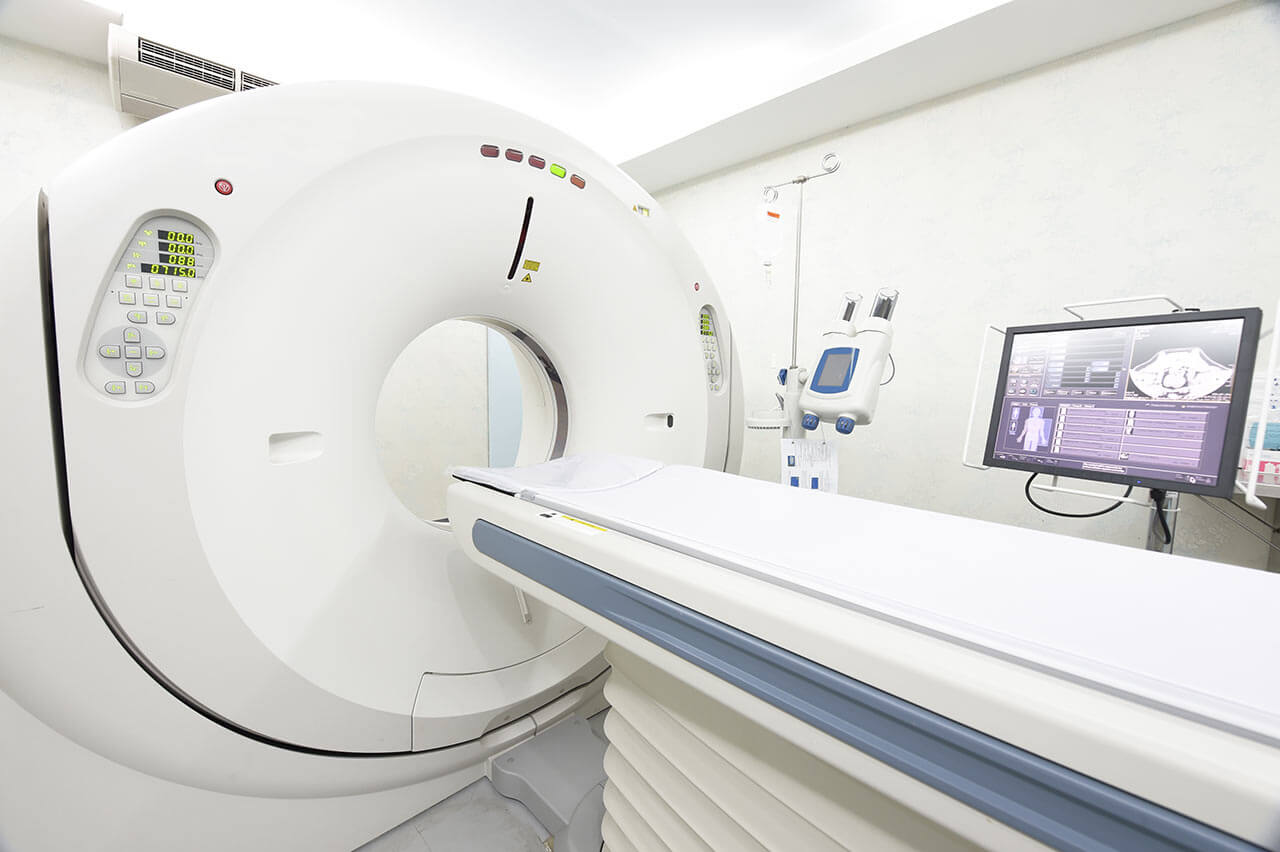
The program includes:
- Initial presentation in the clinic
- clinical history taking
- review of medical records
- physical examination
- laboratory tests:
- complete blood count
- general urine analysis
- biochemical analysis of blood
- inflammation indicators (CRP, ESR)
- indicators blood coagulation
- neurological examination
- CT/MRI scan
- neuropsychological tests (on indications):
- ENMG (electroneuromyography)
- EEG (electroencephalography)
- SEPs (somatosensory evoked potentials)
- VEPs (visually evoked potentials)
- BAEP tests (brainstem auditory evoked potential)
- preoperative care
- neuronavigation-assisted surgical removal
(resection) of spinal astrocytoma - histologically and immunohistochemically
examination of the remote tissues - blood transfusions (if needed)
- 1-day intensive care unit stay
- symptomatic treatment
- control examinations
- the cost of essential medicines and materials
- nursing services
- full hospital accommodation
- explanation of future recommendations
Required documents
- Medical records
- MRI/CT scan (not older than 3 months)
- Biopsy results (if available)
Service
You may also book:
 BookingHealth Price from:
BookingHealth Price from:
About the department
The Department of Spinal Surgery at the ATOS Orthopedic Clinic Braunfels provides conservative and surgical treatment for the entire spectrum of spinal diseases. The department's team of doctors specializes in the treatment of cervical, thoracic, and lumbar disc herniations, spinal stenosis, spondylolisthesis, scoliosis, spinal fractures, and facet joint syndrome. Whenever possible, minimally invasive techniques are used to perform surgery: several skin and soft tissue incisions of only 2-3 cm are made to provide surgical access, which significantly reduces the post-operative recovery period and the patient experiences virtually no pain after the intervention. It should be noted that surgery is a treatment of last resort and is used when conservative treatment options have been exhausted. The department's operating rooms are equipped with the latest technology. Hygiene and safety standards are strictly observed in the department, which allows for successful surgery of any complexity. The specialists work in accordance with the recommendations of the German Spine Society (DWG).
The department is headed by PD Dr. med. Matti Scholz. The specialist has excellent qualifications in the field of spinal surgery, has a European Spine Course Diploma from EUROSPINE, and is also a certified master of the German Spine Society (DWG).
One of the most common diagnoses in the department is herniated discs. The department's doctors most often deal with the treatment of lumbar disc herniations. A hernia causes the protrusion of the intervertebral disc part beyond its normal location, due to which patients suffer from severe back pain (the pain intensifies with physical exertion on the lower back) and limited mobility. To make a diagnosis and elaborate an optimal treatment regimen for the patient, the department's specialists conduct a comprehensive examination, including a medical history, a physical examination, laboratory tests, and CT and/or MRI scans of the spine. Next, spinal surgeons begin planning treatment. In 90% of cases, the specialists manage to get rid of the pathology using conservative treatments such as pharmacotherapy, physiotherapy, heat exposure, manual therapy, massage, laser therapy, and cryotherapy. If the spinal surgeons of the department detect nerve root compression due to a hernia, they perform 3D X-ray-guided local injection therapy together with radiologists. The course of conservative treatment for lumbar disc herniation is 8-12 weeks. If conservative treatment fails, surgery is the only effective way to eliminate the hernia. Such surgical procedures are performed in the department using minimally traumatic arthroscopic techniques, which allows patients to stand on their feet and walk without assistance immediately after the operation.
The department also has extensive clinical experience in providing medical care to patients with spinal stenosis. As the spinal canal narrows, blood vessels, nerve endings, and the spinal cord are compressed, resulting in back pain and limited mobility. The diagnostic protocol for suspected spinal stenosis is based on X-rays and magnetic resonance imaging. As for the treatment, the department's doctors use only conservative measures at an early stage of the disease. They carry out an individually developed course of treatment using physiotherapy, exercise therapy, heat therapy, lymphatic drainage massage, and other methods. In the advanced stages of spinal stenosis, conservative treatment is ineffective, so the patient will have to undergo surgery. It should be noted that delaying the surgery carries the risk of developing a serious neurological deficit. Therefore, the doctors of the department recommend not to delay the operation if there are clinical indications for it. Spinal stenosis surgery is performed using minimally invasive techniques. The surgery takes about 1 hour.
The department's therapeutic options are complemented by the treatment of spondylolisthesis, a spinal instability caused by excessive mobility of the vertebrae. This degenerative disease of the spine causes severe lower back pain, numbness and tingling in the lower extremities, intermittent claudication, and other unpleasant symptoms. In some cases, motor function of the lower limbs and control of bladder and bowel emptying are impaired due to nerve root compression. During the diagnostic process, the department's specialists perform a physical examination, X-ray scans, and magnetic resonance imaging, the results of which are used to determine the course of treatment. Whenever possible, conservative therapy is preferred. Patients are prescribed painkillers, physiotherapy, treatment with a special corset, and electrotherapy. However, conservative measures are not always helpful. In such cases, physicians decide to perform surgery, namely percutaneous spinal fusion. The goal of the surgical procedure is to fuse two or more vertebrae together using a special system of rods and screws to provide stability to the spine.
The department specializes in the treatment of the following spinal diseases:
- Conservative and surgical treatment of cervical, thoracic, and lumbar disc herniations
- Conservative and surgical treatment of spinal stenosis
- Conservative and surgical treatment of spondylolisthesis
- Conservative and surgical treatment of scoliosis
- Conservative and surgical treatment of spinal fractures
- Conservative and surgical treatment of facet joint syndrome
- Conservative and surgical treatment of spinal injuries, including osteoporotic vertebral fractures and their complications
- Conservative and surgical treatment of other spinal diseases
The department's range of medical services includes the following options:
- Conservative treatment
- Pharmacotherapy
- Physiotherapy
- Exercise therapy
- Lymphatic drainage massage
- Classic massage
- Manual therapy
- Laser therapy
- Cryotherapy
- Heat therapy
- Electrotherapy
- 3D X-ray-guided local injection therapy
- Surgical treatment
- Minimally invasive surgical procedures
- Other treatment methods
Curriculum vitae
Higher Education and Postgraduate Training
- 1996 - 2000 Medical studies, Humboldt University of Berlin.
- 2018 - 2021 Distance learning, Master of Health Business Administration (MHBA), Friedrich-Alexander University of Erlangen-Nuremberg.
- 04.2021 Habilitation, Faculty of Medicine, Johann Wolfgang Goethe University Frankfurt. Subject: "Implantation of a zero-profile cervical spine cage with internal stabilization – biomechanics, implant safety, and clinical outcomes."
Professional Career
- 2002 - 2007 Assistant Physician, then Physician, Charite University Hospital Berlin.
- 2008 - 2012 Physician, Center for Spinal Surgery and Neurotraumatology, BG Trauma Clinic Frankfurt.
- 2012 - 2013 Senior Physician, Center for Spinal Surgery and Neurotraumatology, BG Trauma Clinic Frankfurt.
- 2014 - 2021 Managing Senior Physician, Center for Spinal Surgery and Neurotraumatology, BG Trauma Clinic Frankfurt.
- Since 10.2021 Head Physician, Department of Spinal Surgery, ATOS Orthopedic Clinic Braunfels.
Qualifications
- 04.2003 Theoretical foundations of the specialty in emergency medical care.
- 07.2006 Theoretical foundations of the specialty in radiation protection.
- 10.2007 Board certification in surgery.
- 03.2010 Specialization in trauma surgery.
- 11.2011 Board certification in orthopedics and trauma surgery, special trauma surgery.
- 05.2014 European Spine Course Diploma, EUROSPINE.
- 10.2014 Master's Certificate from the German Spine Society (DWG).
- 07.2020 GCP Certificate (basic and advanced courses).
Clinical Interests
- Conservative and surgical treatment of degenerative spinal diseases with a special focus on the treatment of herniated discs, spinal stenosis, facet joint arthrosis, and spinal instability.
- Conservative and surgical treatment of injuries of all parts of the spine and their consequences.
- Conservative and surgical treatment of osteoporotic vertebral fractures and their consequences.
- Surgical correction of spinal curvatures: scoliosis and kyphosis.
Memberships in Professional Societies
- Since 2007 German Spine Society (DWG).
- Since 2007 German Trauma Society (DGU).
- Since 2007 German Society for Orthopedics and Trauma Surgery (DGOU).
- Since 2006 AOSpine (from 2013 to 2015 – Board Member; since 2019 – Chairman).
- Since 2014 EUROSPINE.
Photo of the doctor: (c) ATOS Orthopädische Klinik Braunfels
About hospital
The ATOS Orthopedic Clinic Braunfels is a specialized medical facility for the treatment of musculoskeletal diseases. The clinic provides high-quality medical care for patients with hip, knee, and shoulder diseases, and also treats the entire range of hand diseases and spinal pathologies. The medical institution enjoys the status of a leading Center of Excellence for Arthroplasty and Spinal Surgery in the German state of Hesse. The clinic is distinguished by excellent results in the field of hip replacement surgery and hip arthroscopy. The clinic boasts of its excellent medical and technical base. The health of patients is in the safe hands of highly qualified doctors with many years of experience in the treatment of orthopedic diseases. Doctors are guided by the recommendations of the German Society for Orthopaedics and Trauma Surgery (DGOU) in their everyday clinical practice.
The ATOS Orthopedic Clinic Braunfels has 116 inpatient beds. The clinic treats more than 3,000 inpatients and more than 9,000 outpatients annually. The clinic's team of orthopedists performs more than 1,500 surgical procedures of varying complexity annually, the majority of which are hip and knee replacement surgeries. The clinic performs over 500 surgical procedures on the spine every year, so the doctors are deservedly proud of their wealth of experience and outstanding success in this area.
Before prescribing a course of treatment, a team of orthopedists conducts a comprehensive diagnosis. The treatment regimen is always developed individually, taking into account the needs and wishes of each patient. Conservative treatment options are considered first. If they do not bring the desired result or the patient seeks medical help at an advanced stage of the pathological process, surgery will be prescribed. The clinic's specialists use modern minimally traumatic surgical techniques, which contribute to minimal surgical risks and rapid recovery after surgery. The clinic uses the innovative ROSA® robotic system for knee replacement surgery. This allows for high-precision positioning of the prosthesis, which largely determines the success of the surgical procedure.
The ATOS Orthopedic Clinic Braunfels has everything necessary to restore the patient's health: highly qualified doctors, advanced technologies, sparing treatment methods, sensitive care, and a high level of comfort. The medical institution is one of the best in Germany in its field of competence, which is confirmed by patient ratings and reviews, as more than 88% of patients highly rate the treatment here and recommend the services of this clinic.
Photo: (с) depositphotos
Accommodation in hospital
Patients rooms
The patients of the ATOS Orthopedic Clinic Braunfels stay in comfortable single and double rooms with all necessary amenities. The patient room furnishings include a comfortable automatically adjustable bed, a bedside table with a pull-out tray, a wardrobe, a table and chairs, a TV, and a telephone. The patient rooms have access to Wi-Fi. Each patient room has an ensuite bathroom with a shower and a toilet.
Meals and Menus
Patients are offered delicious and balanced meals three times a day: breakfast, lunch, and dinner. The menu always features dietary and vegetarian dishes. If necessary, the patient will be provided with an individual menu.
Further details
Standard rooms include:
![]() Toilet
Toilet
![]() Shower
Shower
![]() Wi-Fi
Wi-Fi
![]() TV
TV
Accompanying person
Your accompanying person may stay with you in your patient room or at the hotel of your choice during the inpatient program.
Hotel
You may stay at the hotel of your choice during the outpatient program. Our managers will support you for selecting the best option.




